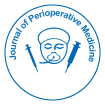
Journal of Perioperative Medicine
Open Access
ISSN: 2684-1290

ISSN: 2684-1290
Short Communication - (2024)Volume 7, Issue 2
Palpitations are the sensation of an abnormal heartbeat, which may feel like your heart is fluttering, pounding, or skipping beats. These sensations can be felt in the chest, throat, or neck. Palpitations can occur randomly or be triggered by various factors such as stress, anxiety, caffeine, nicotine, or certain medications [1]. By delving into the factors that trigger palpitations, recognizing associated symptoms, and exploring potential interventions, individuals can gain clarity and confidence in managing this common phenomenon. With an emphasis on education and awareness, this discussion seeks to empower readers to navigate palpitations with ease, ensuring timely intervention when necessary while offering reassurance about their often benign nature.
Causes of palpitations
Stress and anxiety: Emotional stress and anxiety can trigger the release of stress hormones like adrenaline, which can cause the heart to beat faster and harder, leading to palpitations.
Caffeine and stimulants: Beverages like coffee, tea, and energy drinks that contain caffeine can stimulate the heart and cause palpitations in some individuals [2-4].
Nicotine: Smoking or using nicotine products can stimulate the heart and increase the likelihood of palpitations.
Medications: Certain medications, such as asthma inhalers, decongestants, and some over-the-counter cold and allergy medications, can cause palpitations as a side effect.
Medical conditions: Underlying medical conditions such as arrhythmias (irregular heart rhythms), heart valve disorders, thyroid disorders, electrolyte imbalances, and anemia can all contribute to palpitations [5].
Symptoms of palpitations
Aside from the sensation of irregular heartbeat, palpitations may be accompanied by other symptoms, including:
• Dizziness or lightheadedness
• Shortness of breath
• Chest pain or discomfort
• Sweating
• Fainting or near-fainting spells
When to seek medical attention
While palpitations are often harmless, they can sometimes indicate a more serious underlying condition. It's important to seek medical attention if you experience any of the following:
• Palpitations that occur frequently or persist for a prolonged period
• Palpitations accompanied by chest pain, dizziness, fainting, or difficulty breathing
• Palpitations that interfere with your daily activities or quality of life
• Diagnosis and treatment
Treatment of palpitations
If you experience palpitations, your doctor may perform a physical examination, review your medical history, and order tests such as an Electrocardiogram (ECG), Holter monitor, or echocardiogram to determine the underlying cause. Treatment for palpitations depends on the underlying cause but may include:
Lifestyle changes: Avoiding triggers such as caffeine, nicotine, and stress, as well as practicing relaxation techniques, can help reduce palpitations [6,7].
Medications: In some cases, medications such as beta-blockers or antiarrhythmic drugs may be prescribed to help control palpitations.
Cardioversion: In cases of severe or persistent palpitations caused by arrhythmias, cardioversion may be performed to restore normal heart rhythm.
Catheter ablation: This procedure involves using radiofrequency energy to destroy abnormal heart tissue that is causing palpitations [8-10].
In conclusion, palpitations are a common phenomenon with various triggers, ranging from stress and caffeine to underlying heart conditions. Recognizing the symptoms, such as a racing or irregular heartbeat, chest discomfort, or dizziness, is essential for seeking timely medical evaluation. Treatment options may include lifestyle modifications, medications, or procedures, depending on the underlying cause. Consulting a healthcare professional for accurate diagnosis and personalized management. By understanding the causes, symptoms, and treatment modalities, individuals can effectively address palpitations and improve their overall heart health and quality of life. It is essential to consult with a healthcare professional for proper evaluation and guidance tailored to individual needs. With knowledge and appropriate support, individuals can navigate palpitations with confidence and peace of mind.
[Crossref] [Google Scholar] [PubMed]
[Crossref] [Google Scholar] [PubMed]
[Crossref] [Google Scholar] [PubMed]
[Crossref] [Google Scholar] [PubMed]
[Crossref] [Google Scholar] [PubMed]
[Crossref] [Google Scholar] [PubMed]
[Crossref] [Google Scholar] [PubMed]
[Crossref] [Google Scholar] [PubMed]
[Crossref] [Google Scholar] [PubMed]
Citation: Pasli S (2024) Understanding Palpitations: Causes, Symptoms, and Treatment. J Perioper Med. 7:210.
Received: 04-Mar-2024, Manuscript No. JPME-24-29984; Editor assigned: 06-Mar-2024, Pre QC No. JPME-24-29984 (PQ); Reviewed: 20-Mar-2024, QC No. JPME-24-29984; Revised: 27-Mar-2024, Manuscript No. JPME-24-29984 (R); Published: 03-Apr-2024 , DOI: 10.35248/2684-1290.24.7.210
Copyright: © 2024 Pasli S. This is an open-access article distributed under the terms of the Creative Commons Attribution License, which permits unrestricted use, distribution, and reproduction in any medium, provided the original author and source are credited.